
 |
|
|
#1 |
|
(deceased)
Join Date: Dec 2004
Location: East Coast USA
Posts: 3,191
|
A recent addition probably circa 1920-30? Comments welcome. From what I have read these knives were originally weapons of war that evolved into status symbols.
|
|
|

|
|
|
#2 |
|
Member
Join Date: Sep 2010
Location: New Mexico-Santa Fe
Posts: 9
|
This is a very nice one. The characteristic Mangbetu sculptural ironwork in these is very conservative-the form is quite standardized. Ivory hilts are often seen. Much rarer are these same knives with solid copper blades.
The Mangbetu are a large group and were formerly quite powerful and had large,sophisticated courts. They had major influence and dominance over neighboring peoples and conducted substantial trade as well.Early European accounts are numerous and excellent sources for descriptions of Mangbetu culture. The entire region of the Congo was densely populated with a huge number of distinct cultures. The tribal arsenal is probably the most complex in Africa with a bewildering variety of uniquely shaped weapons. Many of the knife and sword types are of such unwieldy forms that they must have been intended as much for intimidation as actual warfare. If we note from European sources that these trombash knives/scepters were seen only in the hands of powerful chieftains, it gives us an idea of how large a population the Mangbetu would have been. There are numerous old and legitimate examples of these knives on the market, so we can see the tribal hierarchy must have been widespread and wielded considerable power. |
|
|

|
|
|
#3 |
|
Member
Join Date: Aug 2010
Location: Sydney Australia
Posts: 228
|
I am envious.
The knives and swords of the Congo were what got me into collecting ethnographic edged weapons some 25 years ago. I've never seen one of these with an ivory handle. |
|
|

|
|
|
#4 |
|
(deceased)
Join Date: Dec 2004
Location: OKLAHOMA, USA
Posts: 3,138
|
I HAVE ALWAYS FOUND THESE FACINATING. SO I WILL INCLUDE SOME PICTURES OF A FEW MORE FOR REFRENCE.
THE PHOTOGRAPH WAS TITLED PRINCE ZANDE. |
|
|

|
|
|
#5 |
|
Member
Join Date: Sep 2010
Location: New Mexico-Santa Fe
Posts: 9
|
Beaute Fatale: Armes d'Afrique Centrale
Bruxelles,1992 ISBN 2-87193-172-0 probably expensive as hell, but thank god for Interlibrary Loans! |
|
|

|
|
|
#6 |
|
Member
Join Date: Feb 2006
Location: France
Posts: 472
|
You can find good examples in my book.

|
|
|

|
|
|
#7 |
|
(deceased)
Join Date: Dec 2004
Location: East Coast USA
Posts: 3,191
|
Luc
Was I correct on the age? |
|
|

|
|
|
#8 |
|
Member
Join Date: Feb 2006
Location: France
Posts: 472
|
About 1930, yes. Like this one.
|
|
|

|
|
|
#9 |
|
(deceased)
Join Date: Dec 2004
Location: East Coast USA
Posts: 3,191
|
Luc
You are a good teacher 
|
|
|

|
|
|
#10 |
|
Member
Join Date: Dec 2004
Location: Sint-Amandsberg (near Ghent, Belgium)
Posts: 830
|
Nice piece, Lew.
Luc, could it be that the ones with a wooden handle are older models ? For example, like these ones : 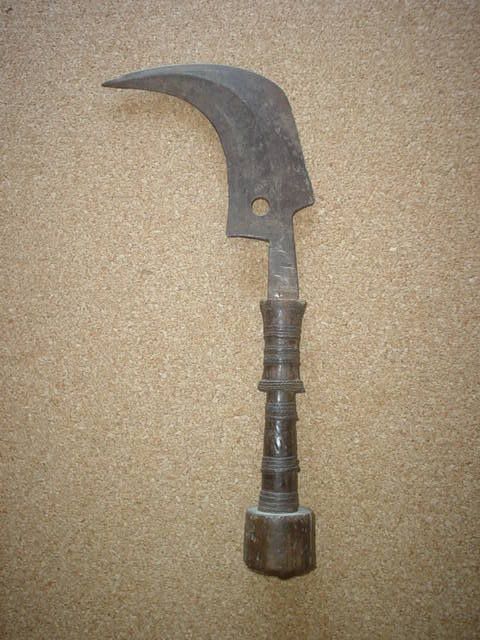 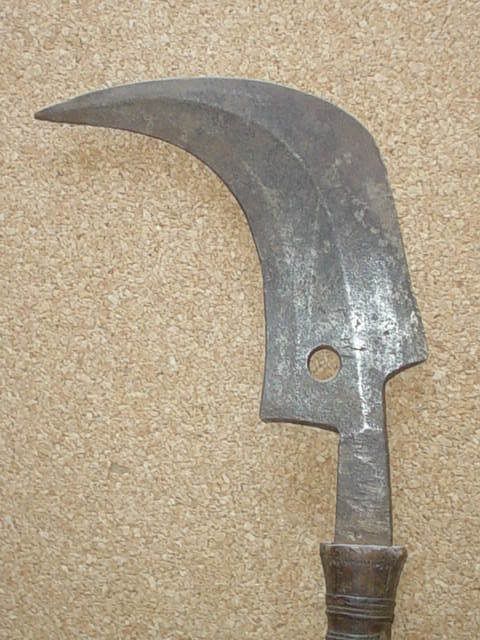 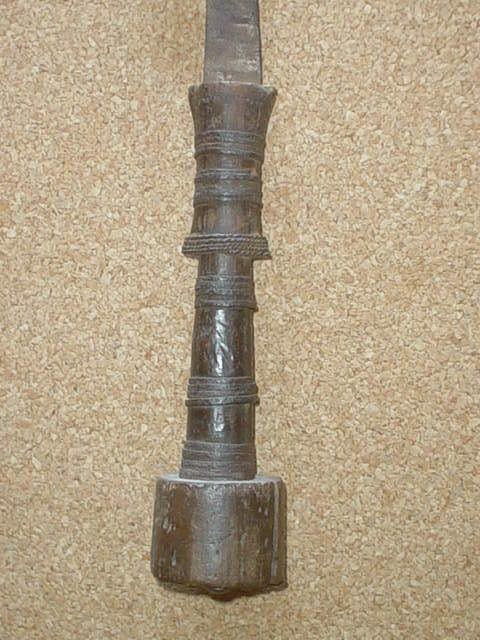 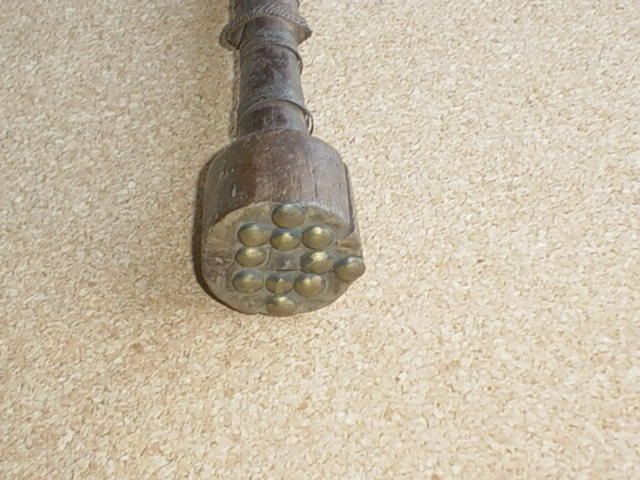 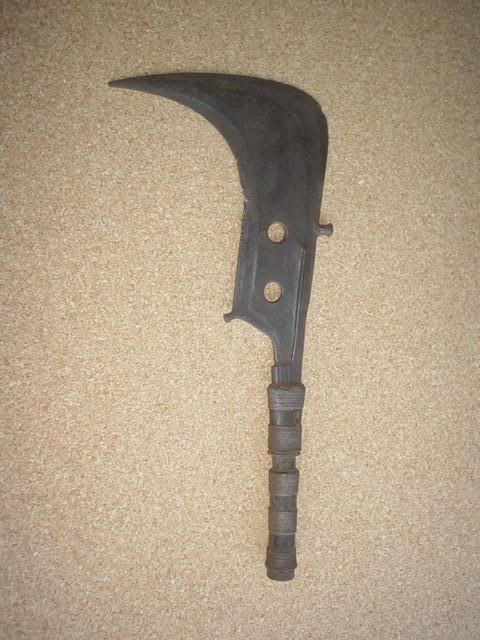 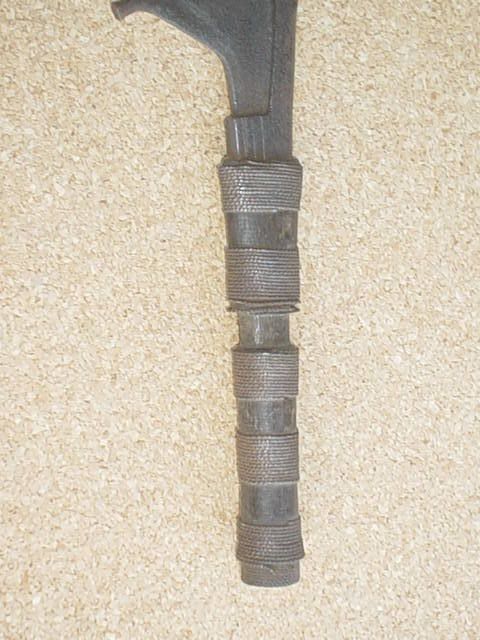 |
|
|

|
|
|
#11 |
|
Member
Join Date: Feb 2006
Location: France
Posts: 472
|
"Luc, could it be that the ones with a wooden handle are older models ?"
Not systematically, but your knives are from the beginning ot XXth. This one with ivory handle is 1900 or before. |
|
|

|
|
|
#12 |
|
Member
Join Date: Nov 2010
Posts: 129
|
These knives are usually regarded as ceremonial or currency, despite their close kinship with working sickles or billhooks. Most appear to be made mid 19th to mid 20th century, and many hundreds, probably thousands, have been made.
Later 20th century ones, made for the tourists, are made from sheet steel, approx 16SWG (1/16" or 1.6mm approx) thick. However earlier ones are forged and show the most skilled craftsmanship.... What I find intriuging is that the tribe at its height consisted of only 40,000 people, having moved from the Sudan in the middle of the 18th century (ref: http://www.zyama.com/mangbetu/index.htm), living in some 5 main villages (ref: http://en.wikipedia.org/wiki/Mangbetu_people) - say 50% were children and 50% of the adults females, and only say 10% of men of a status worthy of such a ceremonial item - maybe a requirement for 1000 knives - yet it is probable many more knives were produced than needed by the tribes for ceremonial use.... Were they thus ever used as tools??? Have only the 'new' or relatively unused ones survived as collectors' items??? If a symbol of wealth, or currency, would the tribes have parted with them so easily - or did their smiths make a surplus for trade with the belgian colonists???? However, the french Wikipedia site states the Mangbetu were part of a larger ethnic group, totalling over 1.3 million (ref: http://fr.wikipedia.org/wiki/Mangbetu_(peuple)) - so this may explain the apparent surplus of these wonderful knives... Maybe someone on the forum who has greater knowledge than me can answer my query??? |
|
|

|
|
|
#13 |
|
(deceased)
Join Date: Dec 2004
Location: East Coast USA
Posts: 3,191
|
I think the later fancy ones like mine were sold to wealthy farmers at least that is what I was told.
|
|
|

|
 |
|
|